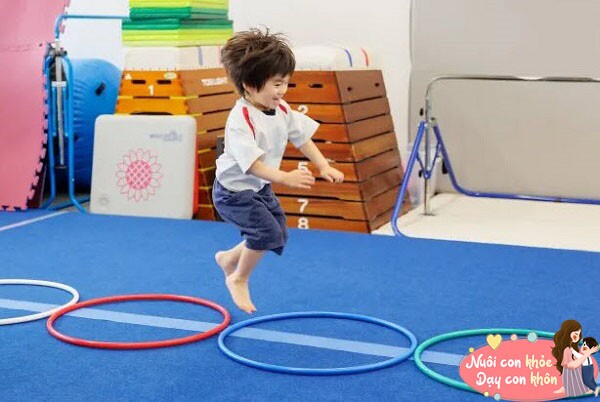There are effective methods to make homeschooling more beneficial. Accordingly, there are nine golden principles that, if applied correctly by parents, will help children develop self-discipline, self-confidence, and optimism in life.

The Law of the Fish Tank: Development Requires Freedom
We can simply understand this law as such: many fish kept in the same tank, no matter how good the conditions are, will not grow as fast as when they are released into the wild.
Fish need space to grow, and humans need even more. Parents often make choices for their children, such as school, clothes, and toys. If children are not given the freedom to choose, they will not develop innovative thinking, dare to try new things, or even make mistakes. Parents tend to overload their children with knowledge without letting them draw their own conclusions.

Development is necessary but it also requires freedom.
Children are like little fish. If they are always kept in a greenhouse and carefully taken care of, they will find it hard to learn how to brave the storms of life.
Greenhouse flowers are the most vulnerable to storms, and children who are always sheltered by their parents are the most likely to be knocked down by difficulties.
Therefore, parents are advised to learn to let go within a controllable range, giving their children more space to master themselves while providing enough opportunities to freely explore, play, make mistakes, and learn from them.

The Rosenthal Effect: Have Positive Expectations for Children
Psychologist Rosenthal once conducted a test on the future development trends of 18 first to sixth-grade classes. He then handed the teachers and principals a list of “Students with the Most Potential.” After eight months, something magical happened: all the students on the list showed significant improvement in their grades, became more lively and cheerful, and communicated better with others. Some may wonder if these students were carefully selected, but in fact, they were chosen at random.

Have positive expectations for children.
Positive expectations are indeed a form of external support.
In people’s minds, family and friends are at the core of this support, and this is becoming more and more shaped. When faced with failure, both children and adults long for this strength. On the other hand, without such positive expectations and support, people tend to become negative or unable to bounce back.
The “Rosenthal Effect” shows that the expectations and encouragement of adults will change the destiny of the child.

The Law of Reinforcement: Help Children Develop Good Habits
Researchers conducted an interesting experiment. They placed a glass wall in the water, with a fish and food on one side. At first, the fish rammed into the glass wall, but after a while, it realized that it was impossible to break through, so it stopped trying. Even after the glass wall was removed, the fish still believed that the wall was there and only swam on its own side.
Human behavior is similar to this story. After a while, or after repeated experiences, our behaviors become fixed and form habits.
Someone once said that it is better to teach children good habits than to teach them many facts.
Forming good habits requires parents to use the right educational methods to guide their children and be diligent and persistent with them. Good habits lie in continuous reinforcement.
If you want your child to develop a reading habit, read with them regularly every day.
If you want your child to form the habit of waking up early, wake up early with them…
Parents should not only adjust their children’s behavior but also appreciate their progress to motivate them to persist.

Help children develop good habits.

The Law of the Wolf: Nurture Curiosity
Wolves are one of the most curious animals in the world. No matter how unpredictable the environment is, they can always find food, sense danger, and survive.
Most of us know that children’s curiosity is very strong. This curiosity drives them to explore the world and discover their potential.
Therefore, in this case, parents should be patient in protecting their children’s curiosity and imagination while encouraging them to think that what they are most interested in at the moment may lie in their potential for future development.
Rousseau once said: “As long as curiosity is well-directed, it can become a driving force for children to seek knowledge.”
Sometimes children will ask outlandish questions, and parents will gradually lose patience. So, the smartest way to educate them is to encourage them to think and let their interest become their best teacher. One day, the seeds of curiosity will take root, sprout, and bear unexpected fruits.

The Law of Dreams: Children Need Dreams to Grow
In a survey on “What do you want to be when you grow up?”, about 92.7% of children wanted to go to a good university and get a good job; only 7.3% of children gave answers such as traveling around the world or working on distant planets. So, where will children’s imagination lead them?
Dreams are limited by reality, but dreams are also our positive expectations about life and our belief in working hard to move forward. They can give us the courage to face difficulties.
Child psychologists believe that dreams have a huge impact on development, and encouraging children to pursue their dreams will create a strong internal drive. Even if the dream is not realized, children will still bravely move forward. Geniuses like Edison, Darwin, and Picasso all had a beautiful dream in their childhood, which led to great achievements in the future.
Children’s dreams need to be carefully nurtured, and only with support can these seeds grow into towering trees.

The Law of the South Wind: Teaching Children Requires a Method
The south wind and the north wind made a bet to see who was stronger. They agreed to try to make a passing walker remove their coat. The north wind blew fiercely, causing the walker to wrap themselves tighter. Meanwhile, the south wind blew gently, and as the sun came out, the walker took off their coat.
Satisfying one’s desires and achieving one’s goals is called the “South Wind Effect.” This effect teaches us that tolerance is a stronger force than punishment.
The same goes for educating children. Criticism will make children rebellious and disobedient. Children will inevitably make mistakes, and parents must learn to teach them in a gentle and appropriate manner.
Giving children enough attention and warmth and using gentle educational methods will be much more effective than arbitrary and harsh punishment.

Teaching children requires an appropriate method.

The Law of Delayed Gratification: Teach Children Patience from an Early Age
Whether or not a person is patient depends on two things: getting what they want, or waiting until what they need arrives. The difference here is patience.
Many parents say that their children tend to want immediate satisfaction. If they don’t get what they want, they will cry and cause trouble, leaving parents feeling helpless.
In reality, it is the lack of training in delayed gratification that makes children impatient.
Therefore, parents should consciously cultivate their children’s ability to delay gratification, teaching them to wait and be patient.
We can try the “three-minute game.” When a child wants something, ask them to wait for three minutes.
After the child adapts to the three-minute wait, gradually increase the time. With consistent training, the child’s endurance will improve.

Teach children patience from an early age.

The Law of Respect: Development Requires Respect
Research shows that in families where parents and children have equal, respectful relationships and maintain open communication, children’s IQs are significantly higher.
This type of relationship creates a positive learning environment, encouraging children to develop critical thinking and problem-solving skills. When children feel that their opinions are heard and respected, they become more confident in expressing their thoughts and emotions.
Self-respect is an important emotional experience that helps children recognize their self-worth. When children do not feel left behind and believe that they are no worse than others, they will be motivated to strive and discover their true potential.
Children with high self-respect tend to set goals for themselves and persevere in achieving them, which will contribute to a brighter future.
To allow children to truly mature, giving them a say in family decisions and discussions will help them feel valued and empowered in life.
The Daytime Maid Works Tirelessly, But Why Does She Fear Her Master’s Slumber at Night?
In ancient times, women of the lower strata of society, especially palace maids, endured unimaginable hardships. Their lives were fraught with challenges and struggles that most of us today cannot even fathom. These women faced a constant battle for survival in a world that often treated them as mere pawns to be sacrificed at the altar of power and prestige.



































